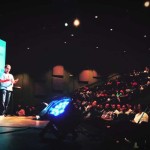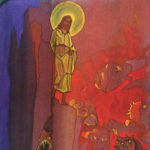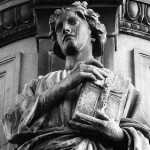We run our website the way we wished the whole internet worked: we provide high quality original content with no ads. We are funded solely by your direct support. Please consider supporting this project.
Why Did Jesus Curse The Poor Fig Tree?
Why Did Jesus Curse The Fig Tree?
One of the strangest episodes recorded in the Gospels is Jesus cursing a fig tree because he was hungry and it didn’t have any figs (Mk 11:12-14; Mt 21:18-19). It’s the only destructive miracle found in the New Testament. What’s particularly puzzling is that Mark tells us the reason the fig tree had no figs was because it wasn’t the season for figs.
On the surface, it might look as if Jesus simply lost his temper and used his supernatural power to punish a poor tree whose only crime was being in the wrong place during the wrong season. Most commentators argue that the fig tree represented Israel and Jesus was symbolically warning that judgment was coming if it didn’t start bearing fruit. This is probably correct, but I don’t think it addresses the most profound significance of this event. If we understand this episode against the background of the apocalyptic thought of Jesus’ day, we can discern another layer of meaning.
Famine was widely believed to be the work of the devil in apocalyptic thought, and barren or infected fig trees became symbols of this fact (Mk 13:8; Rom. 8:35). What is more, many Jews of this time believed the Messiah would free nature from Satan’s grip, thus putting an end to things like famines. When we interpret Jesus’ cursing of the fig tree in this light, it seems evident he was proclaiming that he was the Messiah by “cursing the curse.” And in doing so, he symbolized that he was the long awaited one who would “destroy the devil’s work” (I Jn 3:8) and restore creation.
More generally, Jesus was thus demonstrating that, where God reigns, the demonic corruption of nature will be in the process of being overcome. And he was showing that, when the Kingdom is fully manifested, the whole cosmos will be delivered from the oppressive Powers. There will then be no more famine, droughts or hunger. Nature shall produce abundant vegetation and fruit, as it was always intended to do.
Something similar could be said of other “natural miracles” performed by Jesus. When Jesus miraculously fed the multitudes (Mk 6:30-44; 8:1-10) and brought about a miraculous catch of fish (Lk 5:3-10; cf. Jn 21:1-8), we can understand him to be enacting the truth that when the future Kingdom comes, humans will be reinstated in their proper place of authority, exercising dominion over nature. Consequently, there will no longer be any shortages of food.
So too, when Jesus raised people from the dead, and when he himself was raised from the dead, he was revolting against the reign of death and the one who holds the power of death (Heb. 2:14). And in doing this, he was pointing to a time when “the last enemy” would be utterly destroyed and death would be no more (I Cor. 15:26.)
So, Jesus cursing of the fig tree wasn’t the result of a temper tantrum. Jesus was cursing the curse and revealing himself to be the long awaited Messiah who would eventually free creation from the bondage of Satan.
Category: Q&A
Tags: Bible, Jesus, New Testament, Q&A
Topics: Enemy-Loving Non-Violence
Related Reading

What is the significance of Jeremiah 38:17–18, 20–21, 23?
The Lord prophesies to Zedekiah, “If you will only surrender to the officials of the king of Babylon” the city and his family would be spared, but “if you do not surrender” the city and his family would be destroyed. He then reiterates, “But if you are determined not to surrender” even Zedekiah himself would…

Sermon Clip: Extravagant Forgiveness, Extravagant Love
Greg Boyd had the wonderful opportunity to guest speak at a great church in Carlisle, PA called Carlisle BIC. He spoke on the topic of forgiveness and love. In this short clip, Greg describes how a prostitute was being judged by the Pharisees, but Jesus came to her rescue. You can listen to the full…

How do you respond to Isaiah 46:9–11?
The Lord says, “I am God, and there is none other; I am God, and there is no one like me, declaring the end from the beginning and from ancient times things not yet done, saying ‘My purpose shall stand, and I will fulfill my intention.’” To distinguish himself from the dead idols Israel was…

Podcast: Did Jesus Descend Into Hell?
Greg psychologizes Christ on the cross. http://traffic.libsyn.com/askgregboyd/Episode_0343.mp3

Why did God create me with an uncontrollable sex drive?
Question: Why did God create us with far more of a sex drive than we need for reproduction and far more than we can handle to refrain from sex before and outside of marriage? It seems like a cruel joke! Answer: Sex is a wonderful, beautiful, God-glorifying gift. It’s not just for reproduction–it’s also for…

History and Bible: Do They Align?
To begin, it is significant that when Jesus and the authors of the NT referred to their sacred writings as “God-breathed,” they were referring to the writings that had been handed down to them. So too, the text that the Church has always confessed to be “God-breathed” has been the canon she received. Never has…
